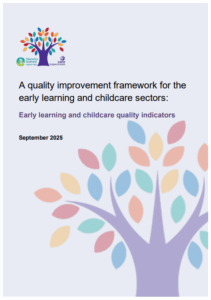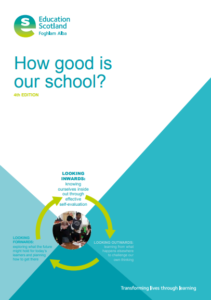Playing, Learning and Developing p27 – Children’s Engagement
We have a strong understanding of how children develop, learn and progress. Our staff skilfully use relevant theory and practice to support their delivery of high-quality play experiences that excite and engage children as they learn. Children are successful, responsible and confident in their play as a result of the high-quality experiences we offer. They are highly motivated and fully engaged by the range of rich, challenging, planned and responsive experiences both indoors and outdoors.
Playing, learning and developing p28 – Quality of interactions
Careful observation allows us to interpret children’s interests and provide opportunities to extend their thinking without directing their play. We use a variety of approaches to respond to children’s cues to support development of self-regulation, empathy, confidence, creativity and curiosity.
We enable children to play and learn at their own pace, having fun as they explore the world around them. We take time to understand children’s verbal and nonverbal communication which helps us to judge when to interact and when to wait and observe. We encourage children’s interactions with each other, recognising the important role other children have in enriching play. This enables children to make the most of their interactions and experiences.
Playing, learning and developing p29 – Child-centred planning and assessment
Children are at the centre of all planning. We are skilled in recognising the different stages in children’s play and learning and these are thoroughly considered when planning new experiences and opportunities. We use observations of individual children’s patterns of play to plan, support, challenge and extend their learning. This enables children to make progress at their own pace.
p30
We work together with children, families and partners, inviting them to share their knowledge. This deepens our understanding and planning for each child’s learning journey. We share updates on children’s progress and celebrate their successes and achievements.
p31
How do we ensure we keep up to date with relevant theory and demonstrate how our understanding of child development supports high-quality play and learning experiences?
What approaches are we using to promote children’s developing skills over a broad range of areas, such as emotional and social development, emergent language skills, literacy and numeracy?
How do we ensure our approach to children’s needs recognises the independent thoughts and feelings of children as individuals?
Learning, teaching and assessment p40 – Interactions to support learning
Our highly-skilled staff know when to observe play and interact using well-considered questions, commentary and modelling to support and extend children’s learning. We encourage and support children to be independent learners as they develop, apply and consolidate their skills.
Learning, teaching and assessment p41 – Planning and assessment
Working with parents/carers, children, partners and colleagues, we gather a relevant range of information about children and their prior learning. We are highly skilled in observing and documenting children’s significant learning and achievements. Together this robust assessment information provides reliable evidence about children. We use this to form a holistic picture of the child and make accurate judgements about children’s progress and future learning.
Nurturing Care and Support p49 – Connections with Families
We understand that each child’s development is shaped by their family, friends, community and experiences. We warmly welcome families into our setting to share in their child’s experiences and encourage updates about children’s hobbies and interests outside of our setting. This impacts positively on the quality of children’s care and support, both at home and in the setting.
Wellbeing, inclusion and equality p54 – Universal support
Children have high-quality individualised learning and development targets, which build on prior learning. These are reviewed and evaluated regularly with children and their families and when required, other important partners, with appropriate next steps identified. There are strong collaborative partnerships with all those supporting children, including during key points of transition.
Wellbeing, Inclusion and Equality p55 – Identifying and Assessing Learning Needs and Targeted Support
Children’s individual learning needs are identified early through careful observation and effective analysis of robust assessment information from a range of sources. This includes working in close partnership with parents/carers and colleagues to take full account of children’s prior learning and needs
Children’s Progress p59 – Children’s Progress Over Time
Within our setting children make very good progress across almost all aspects of their learning and development as a result of high-quality early learning experiences. From the earliest stages children are becoming increasingly confident, resilient, and independent learners. All children, including those with additional support needs are supported very well to make choices and share their learning and progress in their own individual way.
Children’s progress p60 – Overall quality of children’s achievements
Within our setting children make very good progress across almost all aspects of their learning and development as a result of high-quality early learning experiences. From the earliest stages children are becoming increasingly confident, resilient, and independent learners. All children, including those with additional support needs are supported very well to make choices and share their learning and progress in their own individual way.
Children’s progress p61 – Ensuring equity for all children
Our consistent approach informs what needs to happen to ensure children continue to make progress in their learning and development. We work very effectively with partners, including parents/carers, to secure improved outcomes for children.
p62
How effectively do we build on the skills and experiences children bring from home to ensure they make the best possible progress?
In what ways can we demonstrate children’s achievements, and the range of skills developed as a result of their ELC experience?
How effectively do we share information on children’s progress with families and relevant partner organisations, including colleagues working within and across the early level? How does this ensure children experience continuous and progressive learning?


